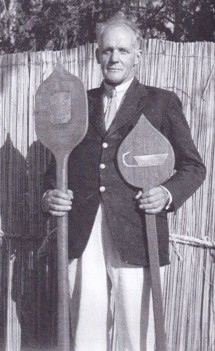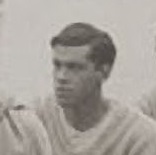Back to search results
Name: BUXTON, Clarence Edward Victor MC (Major)


Nee: son of Sir Thomas Fowell Victor Buxton, 4th Bt., son of Sir Thomas Fowell Buxton, 5th Bt.
Birth Date: 14 Jan 1892 Waltham Abbey, Essex
Death Date: 18 Oct 1967 Mombasa
First Date: 1912
Last Date: 1967
Profession: Served in the Provincial Administration. After retirement he farmed at Limuru. His first wife wrote 'Kenya Days' published in 1927. President of the Oxford & Cambridge Society - 1951. Appointed a DC in 1919. RH s.1277 - DC Kisii in 1921
Area: 'Ithangi' Limuru, Kisii, Naivasha
Married: 1. In Chelsea 13 Dec 1917 Mary Aline Bradshaw , MBE b. 1896, d. 8 June 1954 Boldre; 2. 1945 Mavis Jean Bromhead b. 25 May 1905 Battersea, d. 14 May 2002 Nairob i (prev. m. Maurice Henry Fox 1892-1959) (dau. of Walter Sidney Bromhead)
Children: Maurice (28 Sep 1919 Kensington-2013); Gwendolen (Bowles) (28 Mar 1921 Nairobi-2008); Rupert (3 Aug 1923 Kisii-1994); Rosemary (9 Mar 1927); Rowena Clarence (Tauber) (25 May 1945 Kenya-2012); Rosalind Clarence Carissa (Nightingale) (1945)
Book Reference: Gillett, Barnes, Midday Sun, Oscar, O&C, Staff 39, Debrett, RH, Bror, Dunkley - Hunter Memoirs, Perham, Tignor, KAD, Red 25, Red 31, Hut, Colonial, Curtis, Red 22, Dominion, Nicholls, Burke, Eton, Chandler, Foster, Eton Obs
War Service: Major RFA in WW1, command French Mortar School 2nd Army, despatches and MC
School: Eton 1905-11 and Trinity College, Cambridge, MA 1922 (Rowing Blue)
General Information:
Midday Sun - 'thought by his colleagues to be a bit mad. He was an idealist who believed that you could change human nature, and especially African nature, for the better. I suppose most white people believed this, and that 'for the better' meant 'more like us'. But Clarence - a descendant of the Buxton who had been Wilberforce's right-hand man in the campaign to abolish slavery - chose unusual ways to effect such changes......... Clarence believed that one way to do this was to substitute manly sports for cattle raids, and cricket bats or polo sticks for spears. The Masai kept donkeys, and Clarence had a plan to induce the warriors to play polo mounted on these animals. He also had a stadium built and tried to interest them in football. The more conservative among his colleagues did not really want to see the Masai changed. At heart, I think, they envied these young men's apparent freedom, their status, their physique, the spice of danger in their lives and their sexual opportunities - the warriors could take their pick of lovers among unmarried girls. In fact they had just about everything a young man could want, so why try to turn them into disgruntled, trousered clerks. ........ (more) ...... 'Clarence Buxton's own story ended sadly. Despite his attractive wife and their four children his eye roved, and he was named co-respondent in a suit for divorce heard in Nairobi. The wronged husband was another official, but very much junior in rank and status - in fact, the government analyst. This raised some unkind smiles, since Clarence not only had rather grand connections (son of a baronet) but had been looked upon as a model of rectitude. Such lapses were severely frowned upon in the Colonial Service. Clarence was not dismissed, but transferred to Palestine, the next worse thing. Two years later he resigned and returned to his farm at Limuru, having been divorced and re-married to the government analyst's former wife.
Staff 39 - Seconded to Palestine from 8-10-38.
Ex. Chris Bell - when questioned in court at his divorce and accused of misbehaving himself in the bush he said "Too many bloody ants to have ***** in the bush!"
Dunkley - Memoirs of K.L. Hunter - 1936 - Kisii - " .... The venue of the [Agricultural] show was to be the magnificent stadium which had been constructed by one of my predecessors, Clarence Buxton, taking advantage of famine relief labour. The same DC had also constructed many miles of what became known as the elephant trench, designed to prevent marauding elephant herds entering the district from trans-Mara district to the East. The trench was six feet deep and four feet wide. It would have done much to deter the marauders, but where it crossed the numerous rivers and streams, the elephant merely entered the stream and walked up the water course!"
Perham - 1929 - The Scotts asked me to lunch to meet rather a famous Kenya character, Major Buxton, generally known as 'Clarence', and his beautiful wife Aline. He is one of the Buxtons, brother of Sir Thomas Fowell Buxton, I gather, and he is ardently characteristic of the family. This is rather an unfortunate combination with a post in the Kenya Administration, so it is not wonderful that he has the reputation of a Quixote and never more so since he has employed his fearlessness and faith in the difficult cause of the Masai. The Buxtons are a fine couple; I liked them both at first sight.
Tignor - served in the Masai reserve for more than a decade. 1925 Asst. DC at Fort Hall
KAD 1922 - Administration Cadet, Naivasha.
KAD 1922 - Hon. Sec. & Treasurer, Naivasha Sports Club
Red 25 - District Scoutmaster, Kenya Boy Scouts Association
Curtis - p. 91 - 'Narok Stadium' - Between 1928 and 1936, during postings to Narok and Kajiado, Clarence Buxton was one of the Govt. officers most concerned with development in Maasailand. He was an independent spirit who believed in a personal style of administration. The moran of those days were still brought up to raid in traditional fashion, with the result that hundreds were in jail for stock theft. They still considered themselves independent and refused to pay taxes. To schools and medical and veterinary services they were mostly indifferent. On his second posting to Narok, in 1935, Buxton set out to win the confidence of the Maasai. During the next 8 months he spent more than half his time on safari. Since the only tracks in existence were car-breakers, he either went on foot with at least 21 porters or hired robust lorries at 75 cents a mile, grossly over-spending his travel allowance. He then attempted to improve the roads in order to stimulate trade in and out of Maasailand. Encouraged by their Elders, 300 moran volunteered for road-making. They were formed into gangs of 26, each with its own elected foreman and supervised by a Maasai with experience outside the reserve. However, their contempt for manual labour was not overcome until Buxton picked up a jembe (hoe) and dug alongside them. Eventually a road was cleared through the Mau forest towards Narok, and a grader followed, pulled by oxen trained and managed by the Elders. It was a personal achievement to persuade the moran to do heavy work, but the problem remained of directing their competitive energy and physical fitness to more peaceful pursuits. Hence Buxton's conviction that a stadium should be built at Narok. While the work was in progress he took the chance to teach the technique of ploughing to the moran who were making the track, and in fact they were paid from a budget head called the 'Sports and Ploughman's Vote.' An inaugural sports meeting was held in October 1936 and one Maasai participant was selected for the Kenya athletics team which met Uganda later in the year. On most evenings thereafter football was played in the stadium. Meanwhile the new road was increasingly used as an outlet for ghee and hides.
Red 22 - Secretary and Treasurer, Naivasha Sports Club
Dominion - District Officer - 1930
Nicholls - administrators were expected to display a high standard of conduct. There was a scandal when the DC Clarence Buxton was cited as co-respondent in a divorce case by the government analyst Maurice Fox. 'Intimacy' was supposed to have occurred in a car in the Nairobi Game Park, an accusation denied by Buxton on the grounds that there were too many ticks there. Buxton lost the case and was transferred to Palestine, though he later returned to farm in Kenya.
Eton (1909) - Eton VIII 1910-11; Captain of the Boats 1911; won School Pulling with S.D. Gladstone 1911; Trinity College Cambridge, Cambridge VIII 1913-14; President CUBC 1914 and 1919; won Hambledon Pairs at Henley with M.V. Buxton 1919; served as Major R. Field Art. Sp. Res. and Staff in France in WW1 (Despatches 3 times, MC)
Chandler - Like many of Kenya's early administrators, Buxton was somewhat eccentric - in fact, many of his colleagues considered him quite mad. He was a proponent of a plan to get the Masai interested in sports instead of warfare. To this end he issued them cricket bats and polo sticks, built a soccer stadium, and encouraged the warriors to use their donkeys as polo ponies. The scheme was not entirely successful. Dashing and bold despite his eccentricities, Buxton was considered an up-and-coming politico, possibly even a future governor. Then, suddenly, his career in Kenya ended when he left his wife and 4 children to take up with the beautiful young wife of a junior government analyst. Named as respondent in the analyst's suit for divorce, Buxton denied the charge that he had committed adultery with the young lady in Nairobi Game Park. "In the game park?" he snorted. "Preposterous! Too many ticks." His superiors were scandalized, as much by the lying as by the adultery. Buxton was accordingly exiled to a minor diplomatic post in Palestine, a move considered a punishment just shy of dismissal. Two years later, now married to his erstwhile mistress, he resigned his position and retired to his East African farm at Limuru.
Gazette 17/12/1919 - Arrived on 1st Appointment - Assistant District Commissioner - 5/12/1919
Gazette - 20/7/1921 - Register of Voters - Rift Valley Area - C.E.V. Buxton - Asst. Resident Commissioner - Naivasha
Gazette - 4/5/1921 - Presentation of Honours by Governor - Mrs M A Buxton - OBE
Gazette 6 Dec 1938 Kiambu Voters List
Limuru cemetery Clarence / Edward / Victor / Buxton / 1892 - 1967
Gazette 3 Nov 1967 says he d. 18 Oct.
Back to search results


